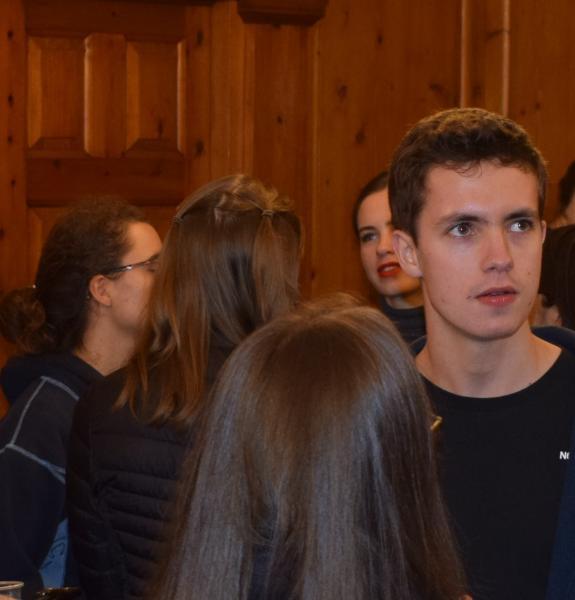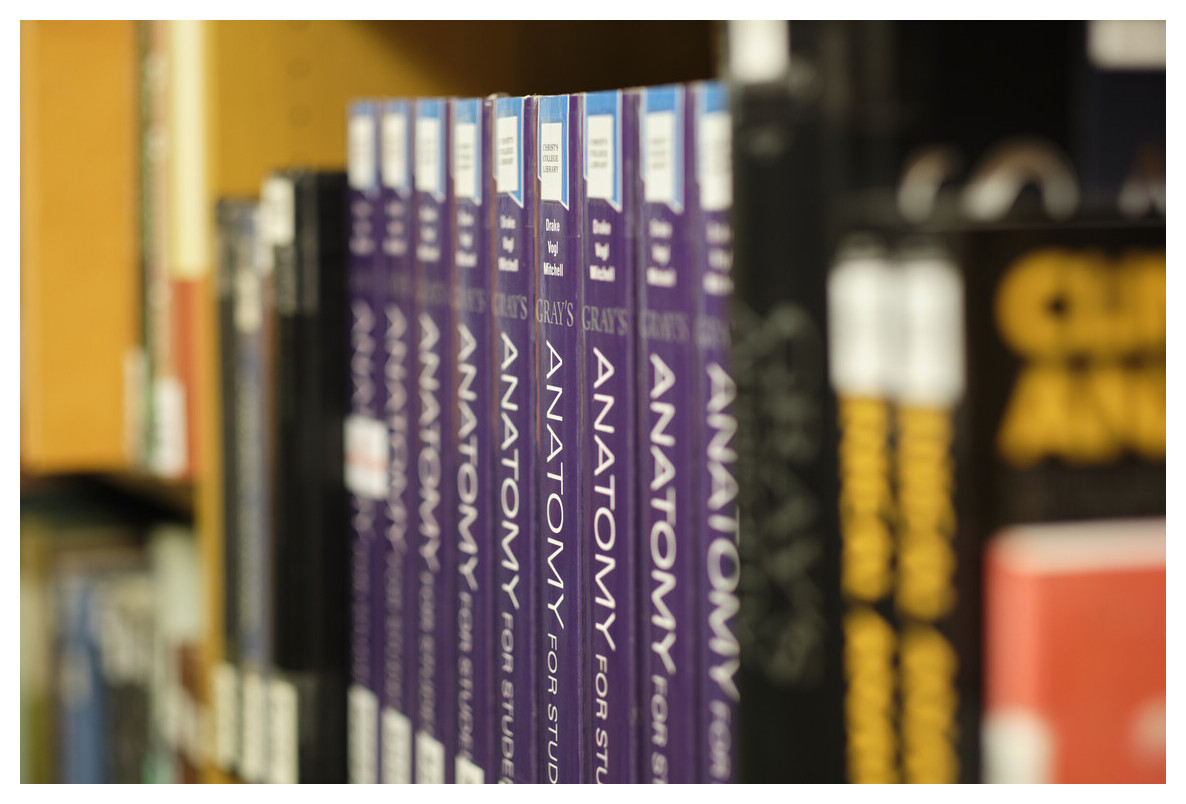 Christ’s is one of Cambridge’s larger colleges for Medicine, with a very strong teaching record in the subject. Most of our Fellows and Bye-fellows in medical subjects are practising doctors, so can share a wide variety of expertise.
Christ’s is one of Cambridge’s larger colleges for Medicine, with a very strong teaching record in the subject. Most of our Fellows and Bye-fellows in medical subjects are practising doctors, so can share a wide variety of expertise.
You’ll find Christ’s staff helpful and supportive and our community very welcoming. The lively Medical Society organises all kinds of events, including an annual dinner, garden party and plenty of social events where everyone mingles. The College is medium-sized, making it easy for you to get to know other students, staff and Fellows, but also find peace and quiet when you need it.
The central location of Christ's works very well for Medicine as the College is very near to the Downing Site, where lectures are, as well as having the advantages of proximity to shops etc.
You study pre-clinical medicine in first and second year, then complete a BA by studying one subject in more detail in third year.
After that, you move on to the Cambridge clinical medicine course, a three-year training programme which leads to a Bachelor of Medicine (MB) and Bachelor of Surgery (B. Chir). The emphasis is on learning in clinical settings (at the bedside, in outpatient clinics and GP surgeries) alongside seminars, tutorials and discussion groups.
Please visit the University website for full details of the Undergraduate Medicine course content and structure, including the course film. You will also find information on the School of Clinical Medicine course page.
The Director of Studies in Medicine at Christ's is Dr Andrew Stewart and the other academics are Prof Mike Edwardson, Dr Isabel Huang-Doran, Professor Jonathan Gillard and Dr James Jones. We also have a number of Bye-Fellows in Medicine: Dr Mary-Ellen Lynall, Dr Tomasz Matys, and Dr David Webster.
You have medical lectures and practical classes just 10 mins walk away from Christ’s. The teaching for the first couple of years is shared between specialist biomedical departments, including Physiology, Development and Neuroscience, Pathology, and Pharmacology, all of which are on the Downing site (see map). The large modern medical library holds a vast collection of sources in hard copy and online, and you have the opportunity to study a range of human skeletons and anatomical models.
College level teaching provides ‘supervisions’ (small group teaching sessions). Our Fellows in Medical Sciences have links with the major teaching departments and the Clinical School, making it easy for us to access course information, find the best supervisors for any subjects and advise you on your options. The College also offers substantial travel awards, grants and prizes in Medicine (as in all subjects) to reward academic excellence.
Read about the experiences of Mithylan, Iona, Juliet, Barnaby, Rory, Erin, Anissa, Neophytos, and Kieran on pre-clinical Medicine at Christ’s, as well as Anna and George on the clinical Medicine course.
If you would hear more from other Christ’s students, please watch the Christ's student Q&A film, and visit our Student Profiles page.
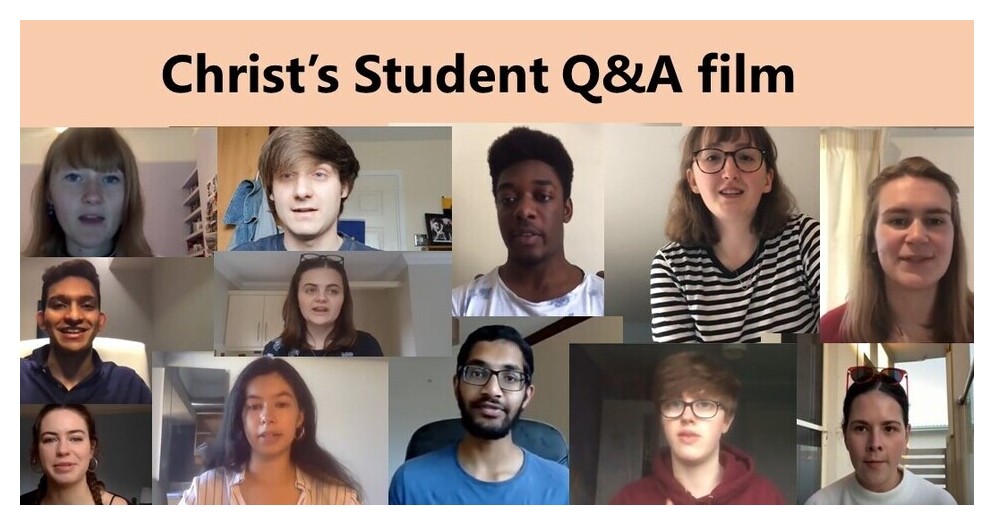
I only have a five minute walk to lectures, or ten if I have a lab or dissection.
How to apply
Visit How to Apply for full details and a timeline of the application process. We welcome applicants from all backgrounds and school types, all over the world. If you're applying from outside the UK, please also read our international students section.
All applicants for Medicine at Cambridge must take the UCAT just before applying. Please see the UCAT section below for further details and ensure that you are registered by the deadline.
For Medicine at Christ's, our minimum requirements at A-level, IB Higher, Scottish Advanced Higher (or equivalent) are: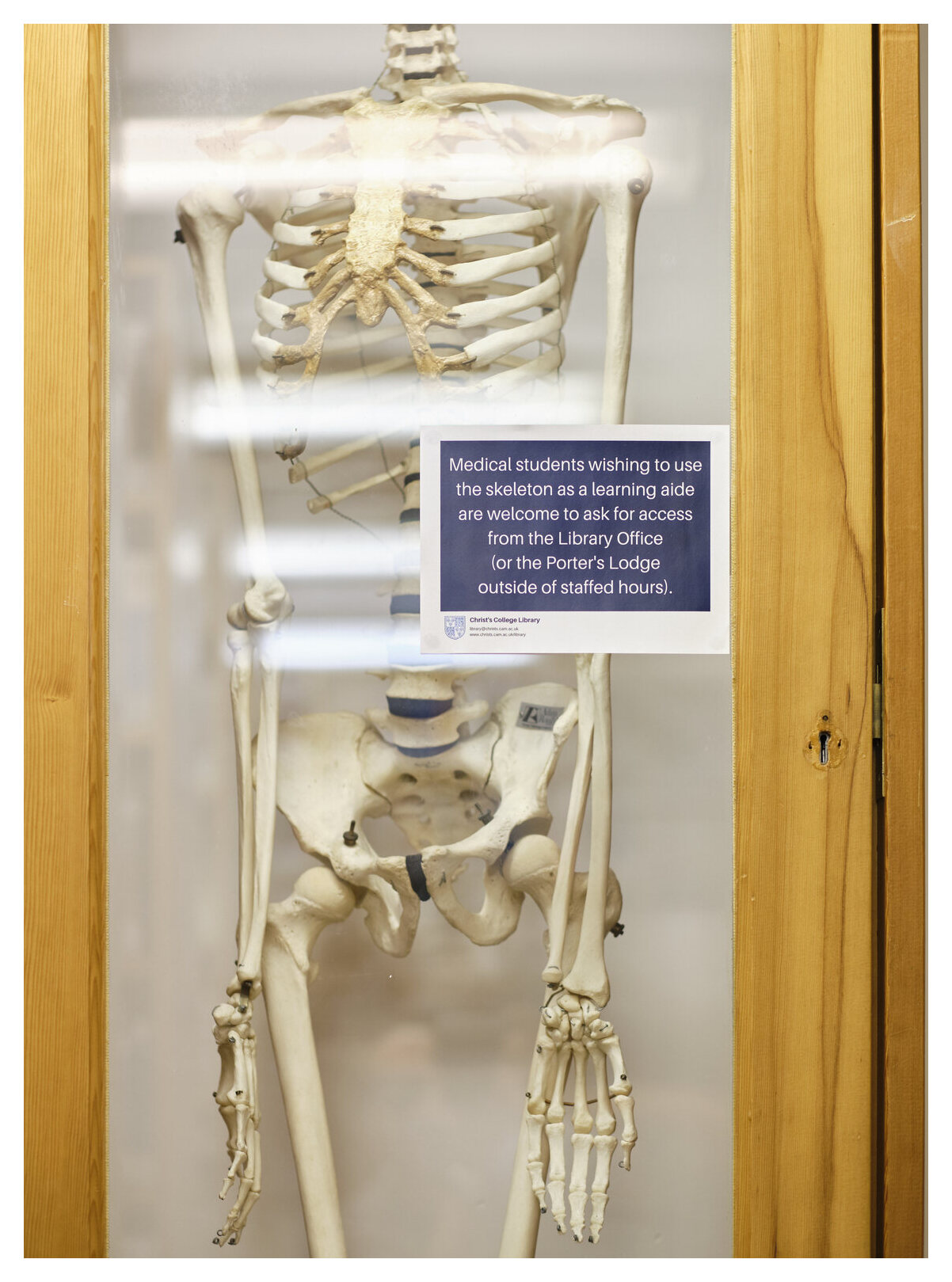
> Chemistry
> Two further subjects out of
> Biology
> Physics
> Mathematics
Notes:
> For International Baccalaureate candidates, note that Maths: Analysis and Approaches is preferred for your Mathematics option.
> A level applicants who want to take Further Mathematics are advised to study it as a fourth subject in addition to Chemistry and two subjects out of Biology, Physics and Mathematics. If you are only taking Mathematics, Further Mathematics and Chemistry, please email us for further information before you apply.
> If you’re taking another qualification, please read about offer levels in other exam systems and international entrance requirements.
It is very important to read the whole of the 'entry requirements' tab in the Medicine course information on the University Admissions website carefully before applying as there are a number of restrictions and details that you need to be aware of.
If you will have finished school when you apply, please also read about post-qualification applications.
We advise applicants to do some relevant work experience or voluntary work in a health or social care organisation if possible.
You need to be aged 18 or over by 1 November in the year you begin your course.
All applicants for Medicine at Cambridge must take a computer-based assessment called the UCAT (University Clinical Aptitude Test) as part of the application process. This is the same at all Cambridge Colleges.You must make a UCAT account and register to sit the UCAT before you apply to Cambridge.
| UCAT 2025: Account creation opens: 13 May, 09:30 UK time Bursary & Access arrangement applications open: 13 May, 09:30 UK time Booking opens: 17 June (06:00 UK time) Testing starts: 7 July Access arrangement application deadline: 16 Sept (12 noon UK time) Booking deadline: 19 Sept (12 noon UK time) Last test day: 26 September Bursary Scheme application deadline: 26 September Early November: results released to universities (Dates as confirmed on the UCAT website) |
You take the UCAT in person at a Test Centre. There are tests centres in over 180 countries. There is an entry fee - see the Pearson VUE website for details of the costs, and note that there is a UCAT bursary for UK students in financial need.
To prepare for the UCAT we advise you to familiarise yourself with the format and use the preparation advice and resources on the UCAT website, alongside question banks and practice tests. See the UCAT preparation page. When using specimen or past papers, we advise you to restrict yourself to the time you would have during a real test for the best preparation.
You will receive a copy of your UCAT score report before you leave the Pearson VUE test centre. Your score report will also be accessible through your UCAT account. Please allow approximately 24 hours after your test for this to be uploaded. The results will automatically be shared with us (you don't need to send them to us). There is no set score that we are looking for and we don't expect you to get every question right. The UCAT forms part of our holistic admissions process, which means that we will look at your scores in the context of your whole application.
If we select you for interviews, these take place in early December. At Christ's we do all of our interviews online. You can have your interviews either at home (most applicants do this) or at school (if easier). The interviews take 35-50 minutes in total. At Christ’s, we usually split the time into two interviews, each with two academics in Medicine.
During the interviews we might ask you about topics you're not familiar with. Our aim is to assess how you solve problems and apply your skills and knowledge, rather than testing you on facts. We also look for evidence that you have the necessary skills to practice clinical medicine.
Further, more general information about interviews (including two useful films) is available in the Cambridge interviews section, and it's worth also having a look at supervisions (short film here), as interviews are similar to what you do every week as a Cambridge student. Do also look at the Cambridge Medicine Interview - Experiences of eight students.
At Christ's we admit 14 students for Medicine each year, which gives us a total of 42 medical students across the three pre-clinical years.
We define the terms of each offer individually, but the minimum offer for Medicine is:
> A levels: A*, A*, A in Chemistry and two further subjects out of Biology, Mathematics and Physics. You will need to achieve an A* in Chemistry.
> 42 points overall in the International Baccalaureate with 7,7,6 at Higher Level including Chemistry, and two further subjects out of Biology, Mathematics (Analysis and Approaches is preferred) and Physics. You will need to achieve a 7 in Chemistry.
> A1, A1, A2 in Scottish Advanced Higher Chemistry and two further subjects out of Biology, Mathematics and Physics. You will need to achieve A1 in Chemistry.
You need to be academically ambitious: the majority of Christ's students arrive with higher grades than are required.
If you're taking another qualification, we expect you to be working at or close to the top of the mark range, for example
> Baccalauréat français international (BFI): 17 (mention très bien) out of 20 overall, with a minimum of 17 in Chemistry and two further subjects out of Biology, Mathematics and Physics.
> European Baccalaureate: at least 85% overall, with 9/10 in Chemistry and two further subjects out of Biology, Mathematics and Physics.
You can look up other qualifications in the offer levels for other exam systems and international entry requirements, and if you are applying from outside the UK please read the Christ's international students section for further information and check the country pages.
If you will have finished school when you apply, please also read about post-qualification applications.
You also need to meet the University's pre-medical requirements, including a satisfactory enhanced Disclosure and Barring (DBS) check (or equivalent). You can find full details in Medicine course information under Entry Requirements.
Would you like to receive these resources in an email? Please complete this brief form.
| UCAT preparation resources | These include an opportunity to familiarise yourself with the format, Question Tutorials, Question Banks and Practice Tests, Test Tools and Candidate advice. |
| Preparatory reading and basic science concepts | Key terms and concepts which all lecturers in the main first year medical courses will expect you to be at least familiar with |
| Work experience / volunteering advice and resources | Doing a small amount of voluntary or paid work in a health or social care organisation is advised for prospective Medicine students. This page offers advice, ideas and resources. |
| Inside the Ethics committee | Programmes on ethics arising from real-life medical cases. |
| Suggestions from our students | Some of our students have mentioned books and resources that they found helpful in their student profiles. Obviously everyone is different but if you're not sure where to start these may give you some ideas. See, for example, Erin's advice, What Juliet found useful, Barnaby's approach, and books Rory enjoyed. |
| Anatomy | TeachMeAnatomy Body of work: the silent teacher helping students learn anatomy |
| Gresham College Medicine lectures | Lectures available online including series such as Major debates in public health, Cancer: A fight we are steadily winning; Chronic diseases and Medical Education and training. You can search for topics such as health, public health or the heart too. |
| Surgical Grand Rounds Lectures | Oxford presentations on clinical cases, followed by educational discussion. |
| A level support resources | These include Issac Physics; Issac Chemistry and the AMSP A level Maths resources. |
| iBiology | Including research talks on Cell Biology, Human Disease, Immunology, Microbiology and Neuroscience. |
| Short online course | Anatomy: Know your Abdomen (University of Leeds) Exploring Cancer Medicines (University of Leeds) |
| Home maths study | NRICH Maths at home |
| Competitions | British Biology Olympiad; Science in Medicine Prize; Peterhouse science essay competition |
| The Royal Society | Science events and lectures, free livestreamed |
| HE+ Medicine | Website for secondary school students who would like to explore Medicine |
| CamGuides | Introducing the academic and information skills that you will need during your studies, as well as how and where you would be working |
The academics are looking for your enthusiasm and to assess how you tackle new questions and concepts. Looking back now, the interview turned out to be very similar to supervisions.
Come to an Open Day or Online Event
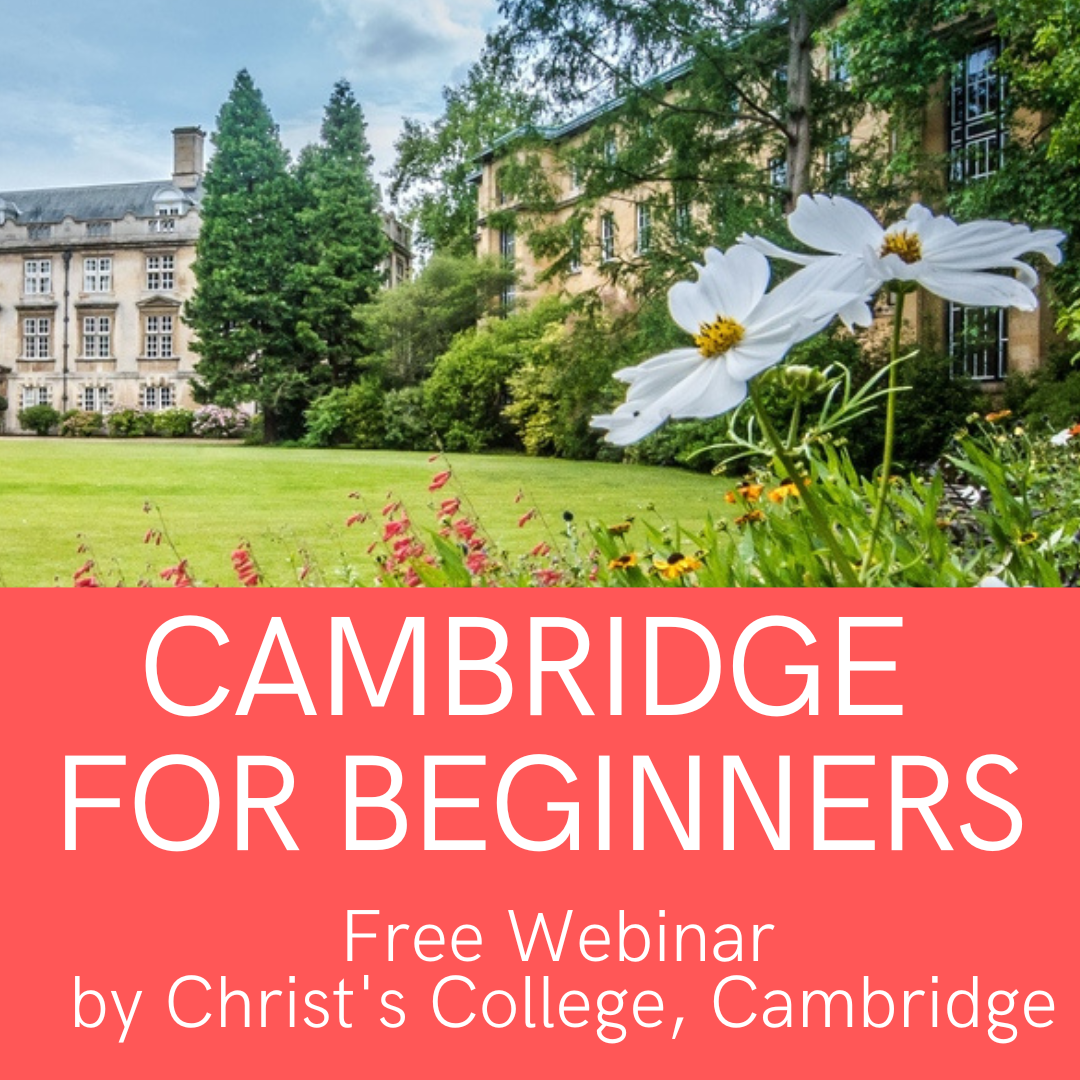
Our open days and events page advertises regular online opportunities as well as events you can attend in Cambridge. Between February and August we run regular webinars:
> Subject Matters: The importance of post-16 subject choices
> Cambridge for Beginners
> Understanding Student Finance
> Personal Statements and preparing for an application
> Webinars for applicants outside the UK
For Medicine, see in particular
> College Open Days
> Christ's UK Medicine Taster Day in Jan/ Feb (eligibility criteria apply)
> Cambridge Festival in March
> Online Subject Meetings in May
> Sutton Trust Summer School in Medicine (eligibility criteria apply)
> Cambridge SU Shadowing Scheme (eligibility criteria apply)
For more detail of what the course involves, please take a look at Undergraduate Medicine admissions on the University website and also read the Faculty of Biology information for prospective students.
And if you have any other questions, send them to us at admissions@christs.cam.ac.uk. We’re here to help.


